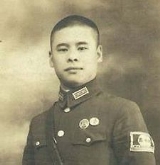
Hu Kexian
Encyclopedia
Hu Kexian was one of the generals of the National Revolutionary Army
(NRA) of China (ROC) during the Second Sino-Japanese War
and the Chinese Civil War
. The 6th year graduate of the famous Huangpu Army Academy (黃埔軍校) at the age of 19, Hu Kexian became a major general at the age of 28 and was in charge of the only heavy artillery regiment (10th regiment/第十團重炮兵團長) of the ROC army during his time. His heavy artillery regiment played a major role during the Second Sino-Japanese war (1937-1945) such as the Battle of Shanghai
(淞滬會戰) because the artillery regiment was trained under the German Nazi instructors and possessed the most effective weaponry in both skill and technology for its time.
Son of an ex-government official (華陽縣縣長) from the last dynasty of Qing (清朝)
, Hu Kexian was sent away by his parents to study business in Chongqing (重慶) when he was a teenager; However, Hu Kexiang ran away during the trip to Chongqing and joined the Huangpu Army Academy in the old Chinese capital of Nanjing/Nanking (南京). The young man had the ambition of helping Jiang Jieshi (Chiang Kaishek) to restore order to China during the period of chaos with warlords throughout the country. By the time Hu Kexian graduated the academy, the campaign against the warlords had already ended, but the invasion of the Japanese had just begun.
Hu Kexian was very talented in the skill of Chinese Calligraphy. During his trip to join the Huangpu Academy, Hu Kexian had run out of money by the time he reached GuangZhou (廣州), where the academy used to be before it relocated to Nanking. Hu was able use his calligraphy skill to make some fast cash to help him reach the academy in Nanking successfully.
After the Chinese Civil War, Hu Kexian became the head of security in the southern region of Taiwan (南區警備司令) and often accompanied Jiang Jieshi (Chiang Kaishek) to patrol and inspect the cities in the region.
Hu Kexian died in Tainan, Taiwan due to cerebral hemorrhage. He was survived by three sons: Hu Shaoning (胡紹寧), Hu Shaorong (胡紹蓉), and Hu Shaoyu (胡紹渝). His eldest son, Hu Shaoning, was the most trusted one and would often be called in by his father to consult on different matters.
National Revolutionary Army
The National Revolutionary Army , pre-1928 sometimes shortened to 革命軍 or Revolutionary Army and between 1928-1947 as 國軍 or National Army was the Military Arm of the Kuomintang from 1925 until 1947, as well as the national army of the Republic of China during the KMT's period of party rule...
(NRA) of China (ROC) during the Second Sino-Japanese War
Second Sino-Japanese War
The Second Sino-Japanese War was a military conflict fought primarily between the Republic of China and the Empire of Japan. From 1937 to 1941, China fought Japan with some economic help from Germany , the Soviet Union and the United States...
and the Chinese Civil War
Chinese Civil War
The Chinese Civil War was a civil war fought between the Kuomintang , the governing party of the Republic of China, and the Communist Party of China , for the control of China which eventually led to China's division into two Chinas, Republic of China and People's Republic of...
. The 6th year graduate of the famous Huangpu Army Academy (黃埔軍校) at the age of 19, Hu Kexian became a major general at the age of 28 and was in charge of the only heavy artillery regiment (10th regiment/第十團重炮兵團長) of the ROC army during his time. His heavy artillery regiment played a major role during the Second Sino-Japanese war (1937-1945) such as the Battle of Shanghai
Battle of Shanghai
The Battle of Shanghai, known in Chinese as Battle of Songhu, was the first of the twenty-two major engagements fought between the National Revolutionary Army of the Republic of China and the Imperial Japanese Army of the Empire of Japan during the Second Sino-Japanese War...
(淞滬會戰) because the artillery regiment was trained under the German Nazi instructors and possessed the most effective weaponry in both skill and technology for its time.
Son of an ex-government official (華陽縣縣長) from the last dynasty of Qing (清朝)
Qing Dynasty
The Qing Dynasty was the last dynasty of China, ruling from 1644 to 1912 with a brief, abortive restoration in 1917. It was preceded by the Ming Dynasty and followed by the Republic of China....
, Hu Kexian was sent away by his parents to study business in Chongqing (重慶) when he was a teenager; However, Hu Kexiang ran away during the trip to Chongqing and joined the Huangpu Army Academy in the old Chinese capital of Nanjing/Nanking (南京). The young man had the ambition of helping Jiang Jieshi (Chiang Kaishek) to restore order to China during the period of chaos with warlords throughout the country. By the time Hu Kexian graduated the academy, the campaign against the warlords had already ended, but the invasion of the Japanese had just begun.
Hu Kexian was very talented in the skill of Chinese Calligraphy. During his trip to join the Huangpu Academy, Hu Kexian had run out of money by the time he reached GuangZhou (廣州), where the academy used to be before it relocated to Nanking. Hu was able use his calligraphy skill to make some fast cash to help him reach the academy in Nanking successfully.
After the Chinese Civil War, Hu Kexian became the head of security in the southern region of Taiwan (南區警備司令) and often accompanied Jiang Jieshi (Chiang Kaishek) to patrol and inspect the cities in the region.
Hu Kexian died in Tainan, Taiwan due to cerebral hemorrhage. He was survived by three sons: Hu Shaoning (胡紹寧), Hu Shaorong (胡紹蓉), and Hu Shaoyu (胡紹渝). His eldest son, Hu Shaoning, was the most trusted one and would often be called in by his father to consult on different matters.

